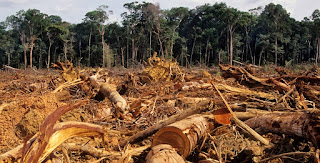An extreme heat wave is currently on in the western part of America and Canada. Canada recorded an all-time high of nearly 50C (122 F) this week. At least 500 people have suddenly died due to heat. Lytton, a Canadian village in British Columbia, caught in a natural wildfire, was almost entirely burnt down.
*****
Forests are our key weapon in the fight to slow the
Earth’s warming. Trees absorb carbon dioxide, older trees have greater ability
to absorb and lock up CO2.
2019 was the second or third warmest year in recorded
human history, depending on the source of data. It was expected that during the
pandemic, the process of de-forestation would slow down. What happened in
reality?
In yesterday’s article, I mentioned that in 2020 the
global carbon emissions came down by 7%. That was the good news.
During the pandemic time, the world lost more than
100,000 square miles of tree cover. (The area of Italy or New Zealand). Tree
cover loss in Russia alone was 21,000 sq miles (the size of Switzerland).
Russia was followed by Brazil (13,000), Australia (9,100), USA (7,600) and
Canada (4,600). In the tropics which include Brazil, India and Africa, more
than 16,000 sq miles of forests vanished, a 12% increase over 2019. This was
despite severe shutdowns.
The pandemic summer months saw massive wildfires in
Russia, Australia and the USA. Droughts and insect infestation also played
their role. Tropics, on the other hand, had mainly man-made disasters. It is
either the inability to control wildfires or the deliberate expansion of agriculture,
and illegal grabbing of forest land. Brazil has the worst record in this
respect.
Global pandemic shutdowns reduced carbon emissions by
2.4 billion tons (7%). The loss of trees resulted in 2.6 billion tons of
emissions in the atmosphere.
The deforestation more than wiped out the pandemic
carbon savings.
*****
The forests lost in wildfires can grow back. From the
carbon viewpoint it is not the same, though. A newly planted sapling will take
decades to acquire the CO2 absorption capacity of a 100-year old tree.
Forests lost in the tropics rarely come back. The
destroyed forest lands are generally used for cattle ranching or growth of
crops like soy. In the southern Amazon, Brazil has illegally claimed large
swathes of land. Wildfires in Brazil often happen when humans light fires to
clear land, and then can’t control the fire. Last year, in Brazil’s vast
western wetland region known as the Pantanal, out-of-control fires consumed a
mindboggling 30% of the rich forest land.
Deforestation sets up a vicious cycle. The destroyed
forests raise the carbon emissions making the earth hotter still. The hotter
Earth causes more wildfires ravaging more forests.
*****
Every year, the ever-growing world population creates
millions of extra mouths to feed. More meat-eating requires even higher amount
of vegetables (because some animals we eat consume multiple times more
vegetables).
Climate experts suggest (a) checking the growth of the
world population through consistent family planning strategies; particularly in
Asia and Africa (b) learn to increase the efficiency of existing agricultural
land. Produce more in the same plot. (c) Reduce food waste. This is something we
can do at our homes and when we eat out. (d) Shifting human diets to include
less meat and fewer dairy products. The vegetarian and vegan movements are not
ideological. Their success will certainly restrict agricultural land expansion.
(e) Planting massive new forests, a process known as “afforestation”. This
could remove substantial amounts of CO2 from the atmosphere each year. However,
doing this on a massive scale could result in a sharp increase in food prices,
according to a report.
*****
Our destruction of nature is the root cause of pandemics.
Razing forests and hunting wildlife bring people into contact with the viruses
and microbes animals carry. This is well known.
Destroying trees and forests also cause irreversible
climate change. The covid pandemic showed that the loss of forests increases
CO2 emissions that can’t be saved by the world’s strictest lockdowns.
Ravi

The situation is getting very very frightening. And still governments are not reacting!
ReplyDeleteEvery one of us at least try to curb down our carbon emission.
ReplyDeletePlease also check out seaspiracy - the documentary on netflix which also details the drastic overfishing further compounding the problems and heating up the seas.
ReplyDeleteHumans are indeed the real virus on planet earth.
Lobh...